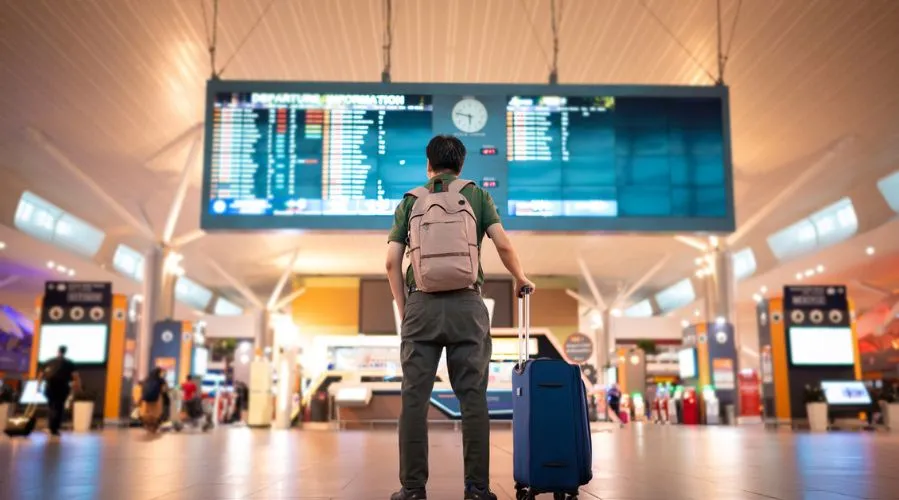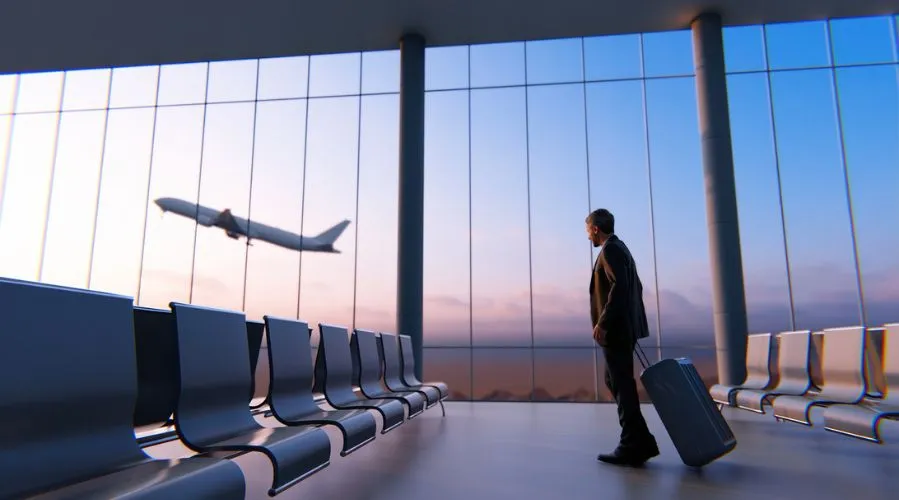Written by the AXA Schengen Team
Date: 07/04/2025
Looking forward to your niece’s wedding in Marseille, training for the Paris marathon, getting ready to start a new professorship at la Sorbonne University or organising a tour of the Normandy beaches? Whatever your exciting plans in France, chances are, as an Algerian national, you will need to apply for a visa to be allowed in the country.
No need to panic! The AXA team has prepared a detailed guide on the different visa for France procedures and how to tackle them without losing your cool (and your mind!). Breathe in, breathe out and let’s get to it!
How to get a Visa for France from Algeria? Follow our lead.
- What is France’s policy in terms of visas?
- Why do Algerian nationals need a visa to visit France?
- What are the different types of French visas?
- How to apply for a visa for France from Algeria?
- Where must you apply for a French visa from Algeria?
- When should you apply for your visa for France from Algeria?
- What documents must Algerian nationals enclose with their visa for France applications?
- How much does a Schengen visa for France cost?
- Why is AXA travel insurance the best choice to obtain a French visa?
What is France’s policy in terms of visas?
- For stays shorter than 3 months (also called short-stays):
As a member of the Schengen area and in compliance with the EU Visa Code, France applies the European Union’s common policy regarding short-stay visas.
- For stays longer than 3 months:
Each Schengen country, including France, applies its own national policy when it comes to issuing long-stay visas.
Why do Algerian nationals need a visa to come to France?
Over a hundred countries worldwide, including Algeria, haven’t signed a visa-waiver agreement with the European Union, therefore their citizens are required to obtain a visa to travel to the Schengen area and consequently to France.
This also applies, for example, to Moroccan and Tunisian nationals. To find out more, read the AXA team’s clear guides on these visa for France procedures:
How to obtain a visa for France from Morocco?
How to obtain a visa for France from Tunisia?
Pro Tip: Explore the complete list of countries subject to the Schengen visa requirement.
What are the different types of French visas?
The type of visa you should apply for depends on how long you plan to stay in France and the purpose of your trip.
- For stays shorter than 3 months, the most common visa is the Type C visa, also called the Schengen or uniform visa.)
- For stays longer than 3 months and depending on the purpose of your stay (work, studies, family reunification, etc.), you will need to apply for a type D visa.
PRO TIP: To make sure you apply for the one best suited to your situation, read more on the different types of visas to visit the Schengen area.
The short-stay visa or type C Schengen visa for France
It is the most asked visa as it is issued for stays shorter than 90 days (3 months), undertaken for the most common purposes: tourism, business meetings, visiting relatives (family or friends), short trainings or internships, taking part in professional, sports or cultural events.
It is called a Schengen visa or a uniform visa as the granting criteria and rights it provides are the same whatever the Schengen country where the application was submitted or which Member State issues it.
A Schengen visa allows one to enter, travel and stay in all the countries and territories of the Schengen area, including France, for up to 90 days over a 180-day period.
It generally allows 1 or 2 entries in the Schengen area.
However, if you often travel to Schengen countries, your best choice might be to apply for a multiple-entry Schengen visa which remains valid from 6 months to 5 years.
PRO TIP: if you want to know how many days you are allowed to stay in the Schengen area, don’t forget to use our Schengen calculator!
Bear in mind! A type C Schengen visa doesn’t grant you the right to work in a Schengen country.
National long-stay visas for France (type D visas)
For stays longer than 90 days and/or undertaken for purposes such as work, studies, long-term internships or for family matters, you will need to apply for a national type D visa.
French long-stay visas are granted for up to 12 months (1 year).
→ Tips for travellers
To help you in your different visa application endeavours, the following guidelines might come in handy:
How to get a long-stay visa (Type D) for France?
How to apply for a student visa for France?
How to obtain a work visa for France?
What are the different types of French marriage visas?
How to apply for a visa for France from Algeria?
Important
- France-visas is the official website when it comes to visas for France.
It provides the resources you need to inform and help you with your French visa application process. - A specific page is dedicated to each country and thus to Algeria.
- You can also use the France-visas wizard for online assistance.
After answering a few questions, you will know if you need a visa and which one.
What are the different steps of the visa for France application process?
1. Check if you need a visa.
Visit the France-visas website and find out if you need a visa and what type.
2. Apply online on the France-visas website
- Log in to your France-visas account or create one using a valid email address.
- Carefully fill out the online application form.
- Print the form, the receipt for your visa application, the list of supporting documents required and take note of the visa fee you will need to pay.
PRO TIP! Use our step-by-step guide on how to fill out the type C visa application form correctly.
3. Book an appointment at a Capago centre to submit your application file.
- Find out of which Capago centre you are affiliated to depending on your place of residence and the consular district it is attached to.
- Visit the Capago website, log in to your account or create one if necessary and book an appointment.
Warning!
- Your appointment will only be validated after you’ve prepaid the Capago service fees online. You have 72 hours to do so.
- Capago is the only partner certified by the French state in Algeria and thus allowed to process visa applications.
Be careful and consider all other sites offering to provide this type of service as scams!
4. Submit your French visa application
- When you attend your appointment at the Capago centre, you need to bring:
- Your application form, duly completed, printed and signed.
- Your passport.
- The required supporting documents (original + copies).
- The email confirming your appointment.
- The visa application fees (cash or credit card).
- A visa agent will meet with you and:
- Check that your application file is complete.
- record your biometric data (front photography and digital prints) unless they have already been collected in the 5 last years.
Good to know! Children under age 12 are exempt but still need to be present at the appointment.
- Receive the payment for the visa fees.
- Keep your passport.
5. Monitor the examination of your visa application file.
You can keep track of the progress of your visa file by logging in to your account on the Capago or France-visas websites.
Good to know! Read our step-by step guide on how to track your application for a French visa.
6. Collect your passport.
- Once your application file has been examined, you will be asked by text and email to recover your passport at the Capago centre where you have left it.
- If your visa is granted, you will find a sticker attached to your passport.
If your visa request is denied, a document will be enclosed listing the reasons why and how you can appeal.
Where must you apply for a visa for France from Algeria?
Bonus news: Starting April 2025, the company Capago, entrusted by French authorities, will take full charge of informing visa applicants and recovering visa applications in Algeria.
The first part of the visa application process is done online:
- On the France-visas website to fill out the form.
- On the Capago website, from the Algeria page, to book your appointment at a centre.
The next step is to submit your visa application at one of the 4 Capago centres in Algeria.
They are located in Algiers, Oran, Annaba and Constantine.
Reminder! The centre you are attached to depends on the constituency of your place of residence.
Good to know!
- Long-stay visa requests motivated by the following purposes: family reunification, introduction of salaried workers (OFII procedure) and PROFAS+ scholarship holders, must be submitted in Algiers, whatever the applicant’s place of residence.
- Some emergency visa application files can be submitted directly at the Algiers, Oran and Annaba consulates.
This can apply to: - Short-stay visas demanded on humane grounds (such as accidents or death of a relative)
- Long-stay visas for a person invited by an international organisation.
When should you apply for your French visa?
For short-stay visas
You can apply 6 months at the earliest and 15 days at the latest prior to your scheduled departure date.
The usual processing time for a Schengen visa application is 15 calendar days.
Beware! It can take longer during the busier times of the year (bank holidays, school breaks and summer holidays, etc.)
Theoretically, it should take no longer than 45 days.
However, due to high demands for French visas from Algeria, it can take several weeks, from 3 to 4 weeks, to find an available date to book an appointment to submit your visa application.
It is thus essential to anticipate and plan enough time between the preparation of your file and your scheduled date of departure.
Our AXA tip to travellers:
We recommend you submit your visa application 6 to 8 weeks prior to your date of departure.
For long-stay visas
You can apply 3 months before your scheduled date of departure.
Processing time for long-stay visa applications is longer as they require several additional verifications and can reach up to 60 days.
Our AXA tip to travellers:
We recommend you submit your visa application from 8 to 10 weeks prior to your scheduled date of departure.
What documents must Algerian nationals enclose with their visa applications?
The documents which must be enclosed with a Schengen visa for France application depend on the applicants’ situation and differ from one to the other.
You will be provided with a precise list adapted to your situation after you’ve filled out the form on the France-visas website.
Here is an indicative and non-exhaustive list of the documents you might be asked to supply.
1- Mandatory documents for all visa applicants
- The application form completed, dated and signed.
- A valid passport: issued less than 10 years ago, valid more than 3 months after your scheduled date of departure from the Schengen area, must include 2 blank pages.
- An ICAO ID picture meeting international standards.
- A travel insurance certificate: the European Union demands that all visa applicants subscribe to travel insurance.
It must comply with several criteria to be accepted with your application.
Travel insurance is compulsory.
Without proof of subscription, your visa for France application will be denied.
PRO TIP: Find out how to easily buy Schengen travel insurance from Algeria.
Good to know! Save time and subscribe to AXA travel insurance for France online.
2- Supporting documents specific to the applicant’s situation
These additional documents can be required to justify, prove or detail:
- The purpose of your stay, mentioned in your visa application
- Your accommodation arrangements during your stay in France.
- Your financial means proving your ability to cover your needs during your stay.
- Your intent on leaving France and the Schengen area at the end of your stay.
3- Documents for applicants practicing specific professions
Official supporting documents will be asked to diplomats, solicitors, doctors, dental surgeons, pharmacists, lawyers, architects, magistrates, senior civil-servants, academics, military personnel, journalists, etc.
Our AXA tip to travellers: On the France-visas’ Algeria page, you will find detailed information concerning the required documents according to specific situations. Don’t forget to read it!
How much does a visa for France cost?
The price of a French visa (or visa fee) depends on the age of the applicant:
- Travellers over 12 years old: full fee
- Children between ages 6 to 12: reduced fee
- Children younger than 6: free of charge
Good to know!
- Depending on the purpose of their trip, some travellers can enjoy a reduced visa fee or even visa fee exemption. Make sure to find out if this can apply to your situation.
- Visa fees are non-refundable even if the visa is denied.
- Additionally to the visa fees (collected by the French administration to cover processing costs), you will have to pay a non-refundable service fee to the visa centre where you’ve applied.
- If you want to find out more, read our article detailing the costs entailed by a Schengen visa application as well as the French administration’s visa rate chart (in French).
Why is AXA Schengen insurance the best choice to obtain a visa for France?
AXA Schengen travel insurance is certified by all the consular services of the Schengen Member States. It is thus automatically accepted with visa applications.
It offers many other benefits:
- Up to €100, 000 medical expense coverage (depending on the chosen option).
- You can easily and quickly subscribe online.
- Once you’ve subscribed, you will immediately receive your travel insurance certificate, allowing you to enclose it with your visa application.
- It offers great value for money.
- It applies a zero-deductible policy.
- There is no age limit.
- It offers 24/7 assistance.
- As well as free medical consultation.
- Several options are available to fit all needs and budgets.
Explore our AXA Schengen travel insurance plans
and unlock exclusive benefits tailored to your journey!
Get your commitment-free online quote now!
Related Articles
You might find these articles interesting:
- All you need to know about the Schengen visa.
- How to obtain a visa for France from Côte d’Ivoire?
- How to obtain a visa for France from Cameroon?
- How to obtain a visa for France from the Democratic Republic of Congo?
- How to obtain a French visa from India?
- How to obtain a visa for France from Madagascar?
- How to obtain a visa for France from Gabon?
- How to obtain a visa for France from Senegal?
- How to obtain a visa for France from the Philippines?
FAQ
In which language should the supporting documents for my France visa application be submitted?
All documents enclosed with your application file must be written in French. Documents in Arabic must be translated by a certified translator. Ask your consulate for a list.
I am the kafil of a minor and I wish to travel with him. What is the visa application procedure in this situation?
Even though a Kafala is not considered as a legal adoption in France, it is recognised by the French administration if it is based on a legal decision. In that case, kafils can apply for their makfoul’s visa. You will find more information related to this matter on the specific page of the France-visas website. It details, among other things, the list of documents to provide in such cases.
Can I send the supporting documents of my visa application online?
No, in most cases, you cannot, except for long-stay student visa applications. Explore the France-visas website for more information.
AXA already looks after millions of people around the world
With our travel insurance we can take great care of you too
AXA Schengen's Travel Insurances

AXA Schengen Low Cost
AXA Schengen Low Cost is perfect to obtain your Schengen visa. This travel insurance meets all the requirements demanded, covers you in all the countries of the Schengen Area as well as 4 European microstates (Andorra, Vatican City, Monaco and San Marino).

AXA Schengen Europe Travel
AXA Europe Travel is perfect to obtain your Schengen visa. It provides coverage in all the Schengen countries + the European microstates + all the EU countries (including UK, Cyprus and the Republic of Ireland). And you get additional guarantees compared to AXA Schengen Low Cost.

AXA Schengen Multi Trip
AXA Multi Trip is perfect to obtain your Schengen visa. This annual travel insurance is ideal for those who often travel to Europe as well as multiple-entry Schengen visa holders. You get the same guarantees as AXA Schengen Multi Trip for different countries during 90 days.


